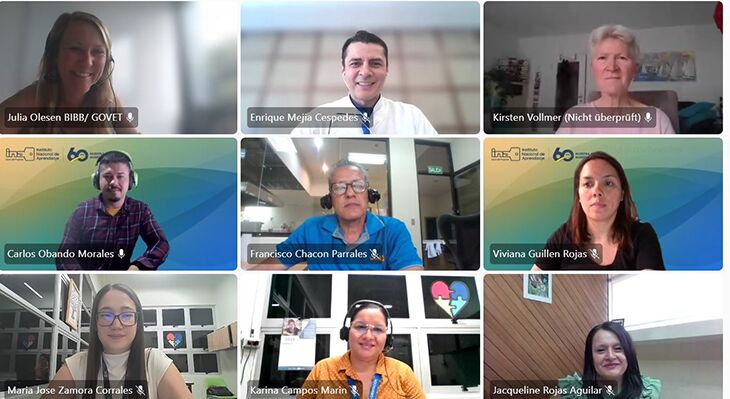Focus on inclusive vocational training – webinar with partner country Costa Rica
27.08.2025
How can people with disabilities be integrated into everyday working life and vocational training? What legal framework do vocational training laws provide? INA and GOVET discussed these issues together in a webinar.

In August, GOVET and the Instituto Nacional de Aprendizaje (INA) in Costa Rica held a webinar on the topic of 'Inclusion of people with disabilities in vocational education and training'. The event provided a platform for discussing experiences, challenges, and potential solutions within an international context, offering an opportunity to learn from each other.
Input from Germany: Contribution by Kirsten Vollmer
Kirsten Vollmer (BIBB, Staff Unit for Vocational Training of People with Disabilities) provided key technical input. She presented the main pillars of vocational training for people with disabilities in Germany:
Dual training in accordance with the BBiG and HwO
- The priority is for young people with disabilities to complete training in recognised occupations – supported by compensation for disadvantages and special training regulations. In cases of particular kinds and degrees of disability, special training arrangements with reduced training content are available, if necessary.
Supported employment
- With the approach ‘First find the right job, then get qualified´, people with disabilities receive individual support and training directly in companies in the general labour market.
Workshops for people with disabilities
- They serve to maintain, regain and develop performance capabilities and participation in working life. Vocational training based on regular training content also takes place here.
Qualification modules and preparation
- For people with learning difficulties or who are socially disadvantaged, there are programmes that prepare them for regular education.
- Kirsten Vollmer emphasised the guideline ‘as normal as possible, as specific as necessary’: vocational training should be as inclusive as possible while taking individual needs into account.
Exchange with Costa Rica
The INA demonstrated how strategies for including people with disabilities are being implemented in Costa Rica. The main point was on curriculum adaptation and raising awareness among trainers. The INA has a central office that provides technical and pedagogical support to vocational training staff in supporting people with disabilities. The INA's philosophy of providing equal opportunities for all and this is crucial.
The webinar highlighted that both countries face similar challenges, particularly with regard to the importance of international cooperation in order to make vocational training more inclusive.